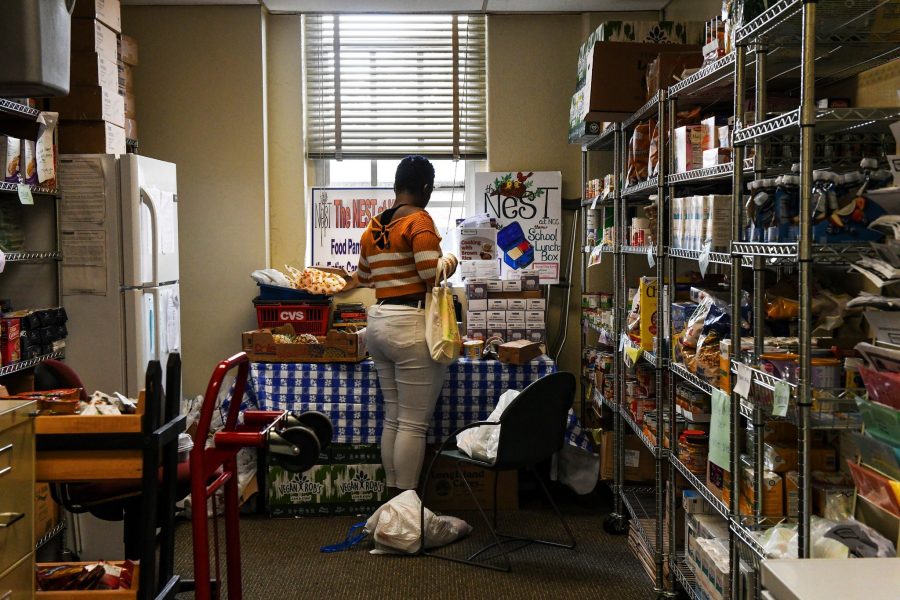Swipe Out Hunger’s food navigators work to end student hunger
February 12, 2021
Swipe Out Hunger’s CUNY Student Food Navigator Program is a digital referral service for CUNY students struggling with food insecurity as part of its mission to address college hunger.
“Swipe Out Hunger is a nonprofit that partners with college campuses nationwide to end student hunger,” Vice President of Programs Marissa Nachman said. “Three core pillars of Swipe Out Hunger’s work are helping campuses launch programs to directly combat student food insecurity, lifting up student voices and providing pathways for students to develop themselves as leaders, and advocating for legislation on a state and federal level to create long-term systemic change.”
CUNY Student Food Navigators are trained by the Food Bank of NYC to connect students in need to the resources they need.
Students fill out a short form on the website or text “food” to 855-230-6746. A navigator will then reach out and help verify their eligibility for SNAP.
“SNAP is a nutrition benefit program that supports families and individuals with food access,” CUNY Student Food Navigator and John Jay student Jessica Rosario said. “They do so through an electronic benefits system allowing for people to purchase food for themselves and their families.”
The navigator then walks the student through the application process, answering any questions and acting as a resource to the applicant.
Once the application is approved, students are given a debit card that can be used at places like grocery stores to purchase food. A single person can receive an average of $125 per month.
“Our main goal is to sign up as many kids for SNAP as possible. Back in October, Governor Cuomo expanded SNAP eligibility to cover an additional 70,000 students,” Suha Chaudhury, a Baruch College sophomore and CUNY student food navigator, said. “A lot of people who applied before and got rejected may now be eligible, so we’re trying to get the word out and get as many kids applied as possible.”
For students who are ineligible to receive SNAP benefits, navigators work to connect them to other resources in their area or campus for issues regarding food or even housing.
Navigators maintain their relationships with their students to ensure they received help.
“I check up on them, I like to keep a rapport with my students,” Chaudhury said. “If I refer them to a food pantry, I’ll contact them up a week later to ask if everything’s good and if they were able to make it to the pantry. Then, if that specific one didn’t work out for them, I’ll research another one for them.”
Since being founded at the University of California Los Angeles in 2010, Swipe Out Hunger is now partnered with over 130 colleges across the country and has served two million meals.
It works with each college to develop anti-hunger programs specific to each campus’ needs.
“The Swipe Drive,” its flagship program, enables students with extra dining dollars or meal swipes to donate them to their peers.
The swipes are either requested by other students to use at their dining hall or converted into dollars and then used to purchase food for a campus pantry.
Swipe Out Hunger also advocates for legislation that fights against food insecurity, such as the Hunger-Free Campus Bill. Created by CEO Rachel Sumekh, it sends funding to public colleges working toward ending hunger for students.
The bill has been passed in California and New Jersey and introduced in several other states.
The COVID-19 pandemic has exacerbated the issue of college hunger, making Swipe Out Hunger’s work more important than ever according to members.
“Barriers related to loss of income, transportation and living environments have made it more difficult for students to have reliable access to basic necessities such as groceries as well as supportive safety nets like pantries or emergency meal swipe programs,” Nachman said.
Rosario spoke to how the challenges of the pandemic have affected CUNY students.
“CUNY serves a diverse community of students, low-income, working-class, parents, and veterans who depend on their college services and on-campus resources,” she said. “Amid the pandemic, CUNY students struggled with finding stable housing, coping with loss of jobs, and not knowing where their next meal was coming from. Some of these issues were already prevalent across our campuses but became heightened during the pandemic.”
Chaudhury agreed.
“Through the pandemic, thousands of people have been impacted and especially CUNY students. I started hearing a lot more stories of people who are losing their jobs and going through a bunch of different crises right now,” she said.
Nachman said she is passionate about the work she does in support of food activism.
“I was delighted to join the organization in 2016 at a time when there were many organizations dedicated to helping students get to college, but few organizations focused on addressing basic needs of students once they were in college,” she said. “I was excited to be part of this burgeoning movement back then and am so proud of the ways Swipe Out Hunger has supported students and moved the needle in the higher ed landscape.”
Chaudhury spoke to the value her work has and the fulfillment she receives from it.
“I think this is my favorite job I’ve ever done in my life,” she said. “It feels nice I made an impact on someone’s life and helped them get through a crisis. Especially now, during a pandemic, everything is so much harder, so the fact I can help someone means a lot to me.”
Rosario echoed these sentiments.
“To me Swipe Out Hunger is the hope that no young person or student will go hungry while pursuing their education,” she said. “Through providing critical resources, filling information gaps, and normalizing these dialogues we can get real solutions to food insecurity in its many facets of the issue.”
Students interested in the cause can get involved by spreading awareness on social media or reaching out to Swipe Out Hunger HQ about starting or expanding upon a food security program or campaign.
“We believe students are the most qualified people to lead the charge,” Nachman said.








